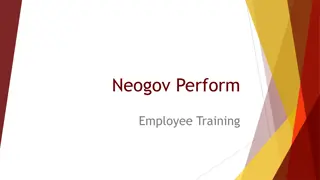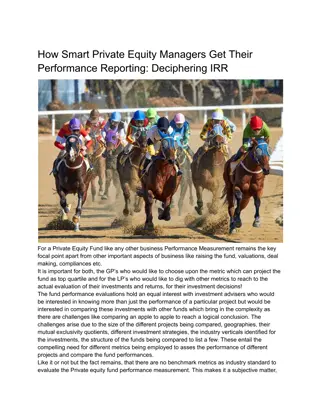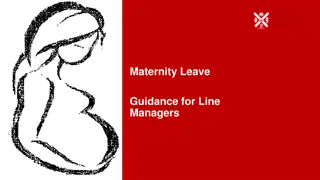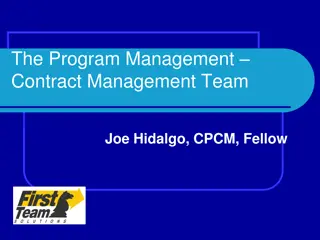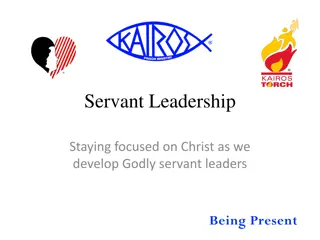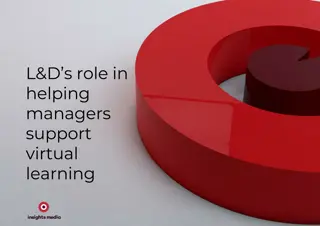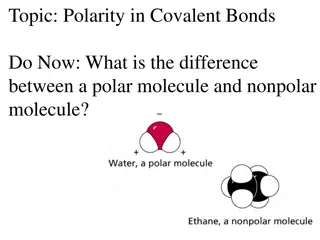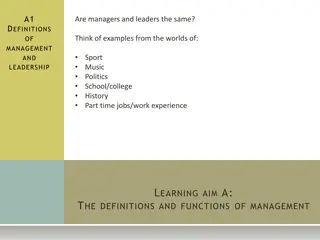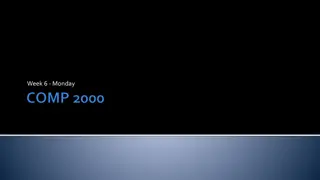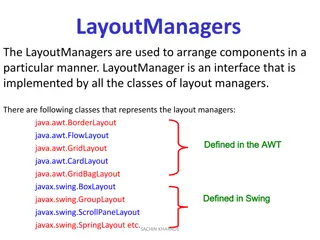Understanding the Difference Between Managers and Leaders
In the realm of management and leadership, the distinction between a manager and a leader is crucial. While managers focus on planning, organizing, coordinating, controlling, monitoring, and delegating tasks to achieve business objectives, leaders inspire, energize, influence stakeholders, envision, and determine the best path to success. Managers primarily deal with operational aspects, whereas leaders are more visionary and focus on motivating and inspiring their teams towards a shared goal.
Download Presentation

Please find below an Image/Link to download the presentation.
The content on the website is provided AS IS for your information and personal use only. It may not be sold, licensed, or shared on other websites without obtaining consent from the author. Download presentation by click this link. If you encounter any issues during the download, it is possible that the publisher has removed the file from their server.
E N D
Presentation Transcript
A2 FUNCTIONSOF MANAGEMENT AND LEADERSHIP With reference to some of the theories you learnt in A1 explain the difference between a manager and a leader. LEARNING AIM A: THE DEFINITIONS AND FUNCTIONS OF MANAGEMENT
FUNCTIONSOFMANAGEMENTANDLEADERSHIP In this topic you will learn about Functions of management Planning Organising Coordinating Controlling Monitoring Delegating Functions of leadership: Inspiring Energising Influencing stakeholders Envisioning Determining best path/route to achieve success
FUNCTIONSOFMANAGEMENT Watch the following video clip Co-op boss: Group 'let down' by former management. What is a manager? In pairs write a definition Discussion: How significant is the role of managers in determining business performance?
FUNCTIONSOFMANAGEMENT Management is the process through which company resources are used and decisions made in order to meet the objectives of the business Managers will set objectives and decide how to go about achieving them The role of management includes: Planning Organising Coordinating Controlling Monitoring Delegating
FUNCTIONSOFMANAGEMENT Planning Audit Objectives A review of where the business is now. Where does the business want to be in the future? How will the business make the journey from where it is now to where it wants to be in the future. It is the role of a manager to PLAN this journey.
FUNCTIONSOFMANAGEMENT Planning the process of outlining and scheduling all of the tasks necessary to achieve an outcome The first role of a manager which is used to inform all other roles Planning involves: Further reading: What is the importance of planning in management? Assessing current performance Collating data to inform future decisions Setting business and/or functional objectives Producing functional plans e.g. a workforce plan Identifying resource requirements Planning, to be effective, must be ongoing
FUNCTIONSOFMANAGEMENT Organising the process of coordinating all of the resources required to achieve an outcome Managers will be responsible for the efficient allocation of resources Resources must be organised so that the correct quantity and quality are available at the right time Inefficient organisation of resources can result in: Inability to match supply to demand Excess resources resulting in higher average costs Poor reputation Over utilisation of resources
FUNCTIONSOFMANAGEMENT In pairs annotate the diagram below to show how resources can be organised. Payment of suppliers Deliveries Employees Resources Finance Stock Production process Administration Assets e.g. vehicles
FUNCTIONSOFMANAGEMENT In reality all of these functions are interrelated rather than isolated functions i.e. 1 can not be achieved without the others. Coordinating The process of bringing together different resources to achieve an objective e.g. the planning of staffing and suppliers to meet demand Often carried out during meetings Requires communication and supervision Controlling Checking progress against pre determined standards to ensure objectives can be met Identifying any issues and taking corrective action
FUNCTIONSOFMANAGEMENT Monitoring How does your college monitor and evaluate your performance? the process of reviewing and assessing progress assessing actual performance against targets monitoring is an ongoing activity where corrective action is necessary evaluating involves forming a judgement on how well functions, products or individuals are performing in relation to targets managers will be responsible for providing feedback on performance
FUNCTIONSOFMANAGEMENT Delegating The passing of authority down the hierarchy Authority occurs when an employee is given the right to do something by their superiors Responsibility remains with the manager This will: free up time for management motivate workers by providing them job enrichment may mean that decisions are being made closer to the grass roots How easy is it to delegate? Are there any risks associated with delegation??
INPAIRS Identify a manager either at college, in the workplace or from another organisation e.g. a sports club. Fill in the table below to show how they fulfil 4 functions. Manager: Planning Organising Coordinating Monitoring
INPAIRS Review the 3 job descriptions below for a retail, office and restaurant manager Identify the similarities and differences Write a generic job description for all managers
FUNCTIONSOFLEADERSHIP What are leaders? In pairs write a list of leaders in sport, history, politics and business. What characteristics do they have? What is the role of the leader in the children s game follow my leader ?
LEADERS Leadership is the ability to influence and direct people in order to meet the goals of a group Leaders are those people that can inspire and motivate people to meet objectives Often leaders and managers are one and the same person, but not all managers are leaders
FUNCTIONSOFLEADERSHIP Inspiring Creating an inspiring business vision A business vision is the core value and purpose of a business i.e. what it wants to achieve overall How great leaders inspire action. Simon Sinek. This is normally presented in a mission statement - a mission statement is a written statement that states the purpose of an organisation A mission statement provides a common focus for everyone within an organisation and hence a common sense of direction Can a leader inspire a team to work as a collective? However, having a written statement alone is not enough. It requires a leader to be successful The vision must be lived from the top down When faced with a decision subordinates will think what would x (the leader) do in this situation?
FUNCTIONSOFLEADERSHIP Energising Creating enthusiasm and motivation Energised employees will have a desire to work hard and to help a business achieve its objectives I have a dream Martin Luther King. Who are the greatest leaders in the world? Leading by example Setting a corporate culture to match the vision A figurehead that people can rally behind Can a leader inspire and energise followers to achieve over and above the norm? Have you ever wanted to work really hard to impress a particular teacher?
FUNCTIONSOFLEADERSHIP Influencing stakeholders Able to shape the behaviours of internal and external stakeholders Effective communication and sharing of values will bring people to a common perspective For example: Energise employees to achieve goals Win the support of investors Build loyalty with suppliers Envisioning The ability to paint a picture of what the future will be like once goals have been achieved Showing future potential Discuss the relationship between envisioning, inspiring, energising and influencing. Can leaders inspire a team to keep going for the promised land?
FUNCTIONSOFLEADERSHIP Determining best path/route to achieve success Clear focus on the vision and objectives Strategic thinking Watch the video and evaluate the effectiveness of Steve Jobs in relation to the functions of leaders inspiring energising influencing stakeholders envisioning determining best path/route to achieve success
FUNCTIONSOFMANAGEMENTANDLEADERSHIP In this topic you have learnt about Functions of management Planning Organising Coordinating Controlling Monitoring Delegating Functions of leadership: Inspiring Energising Influencing stakeholders Envisioning Determining best path/route to achieve success


